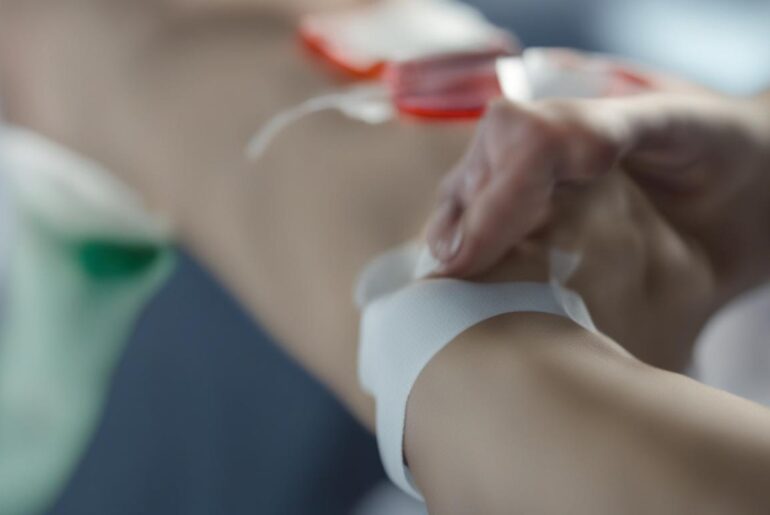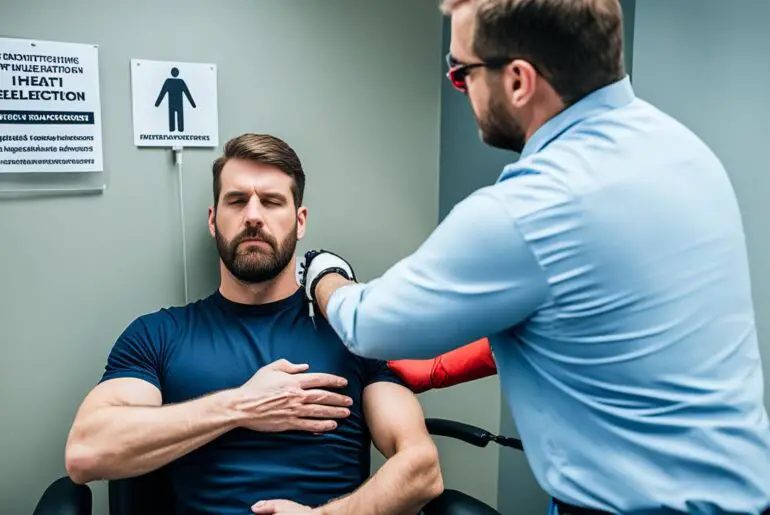Did you know that prolonged use of HCG injections can have serious side effects and complications? While HCG injections are commonly used for fertility treatment and hormone regulation, it’s essential to be aware of the potential risks associated with long-term use. In this article, we will explore the side effects, safety concerns, and FDA warnings surrounding HCG injections. It’s crucial to make informed decisions about your health, so let’s dive in and learn more about the potential risks of prolonged HCG injection use.
Key Takeaways:
- Prolonged use of HCG injections can lead to various side effects and complications.
- HCG injections should only be used under the guidance of a qualified healthcare professional.
- The FDA warns against the use of HCG injection products for weight loss.
- It is crucial to seek medical supervision and consultation before starting HCG injections.
- Proper disposal and storage of HCG injections are important for safety.
Uses of HCG Injections
HCG injections offer various therapeutic benefits in both men and women. Let’s explore the different applications of HCG injections and how they can be used to address specific health concerns.
1. HCG Injections for Fertility Treatment
In women, HCG injections are commonly used as part of fertility treatments. When combined with other medications, HCG injections can help stimulate ovulation and increase the chances of pregnancy. This approach is often employed for women undergoing assisted reproductive technologies such as in vitro fertilization (IVF) or intrauterine insemination (IUI).
2. HCG Injections for Hypogonadism
Hypogonadism is a condition characterized by low testosterone levels in men. HCG injections can be used to address this hormonal imbalance by stimulating the production of testosterone in the testes. By restoring testosterone levels to a normal range, HCG injections can help improve symptoms associated with hypogonadism, such as fatigue, low sex drive, and mood changes.
3. HCG Injections for Testosterone Deficiency
In addition to hypogonadism, HCG injections can be an alternative treatment option for men with testosterone deficiency. By stimulating the body’s natural testosterone production, HCG injections can help alleviate symptoms and restore hormonal balance without the need for testosterone replacement therapy.
4. Other Potential Uses of HCG Injections
Besides fertility treatment and hormone management, HCG injections may have other applications. Some studies suggest that HCG injections can improve sexual function and reverse certain side effects caused by anabolic steroid use. However, more research is needed to fully understand the extent of these benefits.
5. Summary
In summary, HCG injections have diverse uses in the field of reproductive medicine and hormone management. They play a crucial role in fertility treatment for women and offer an effective option for addressing testosterone-related disorders in men. However, it’s important to consult with a healthcare professional to determine the appropriate use of HCG injections based on individual needs and medical history.
| Uses of HCG Injections | Patient Population |
|---|---|
| Fertility Treatment | Women undergoing assisted reproductive technologies |
| Hypogonadism | Men with low testosterone levels |
| Testosterone Deficiency | Men with testosterone imbalance |
| Other Potential Uses | Sexual function improvement, reversal of anabolic steroid side effects (limited research) |
Potential Side Effects of Prolonged HCG Injection Use
Prolonged use of HCG injections can lead to various side effects and complications. It is important to be aware of these risks and to report any side effects to a doctor or healthcare professional as soon as possible. Some of the potential side effects and complications of prolonged HCG injection use include:
Allergic Reactions
HCG injections can sometimes trigger allergic reactions in certain individuals. These reactions may range from mild symptoms such as skin rashes or itching to severe symptoms such as difficulty breathing or swelling of the face, lips, or tongue. If you experience any signs of an allergic reaction, seek immediate medical attention.
Breathing Problems
In rare cases, prolonged HCG injection use may lead to breathing difficulties. This can include shortness of breath, wheezing, or chest tightness. If you experience any breathing problems, it is important to consult with a healthcare professional to determine if it is related to the HCG injections.
Breast Enlargement
Some individuals may experience breast enlargement as a side effect of prolonged HCG injection use. This can occur in both men and women and is known as gynecomastia. If you notice any changes in breast tissue or size, consult with a healthcare professional for further evaluation.
Pelvic Pain or Bloating
Pelvic pain or bloating can be a side effect of prolonged HCG injection use. This can cause discomfort in the lower abdomen and may be accompanied by feelings of fullness or swelling. If you experience persistent or severe pelvic pain or bloating, it is important to seek medical attention.
Sudden Weight Gain
Prolonged HCG injection use has been associated with sudden and unexplained weight gain in some individuals. This weight gain may occur rapidly and without an obvious cause. If you experience significant and unexplained weight gain, it is important to discuss it with a healthcare professional.
Changes in Emotions or Mood
HCG injections can sometimes affect emotions and mood. Some individuals may experience mood swings, irritability, or changes in emotional well-being. It is important to monitor any changes in emotions or mood and report them to a healthcare professional.
Headache
Headaches can occur as a side effect of prolonged HCG injection use. These headaches may range from mild to severe and can be accompanied by other symptoms such as nausea or sensitivity to light. If you experience persistent or severe headaches, consult with a healthcare professional.
Pain at the Injection Site
Some individuals may experience pain or discomfort at the site of HCG injection. This is a common side effect and is usually temporary. If you have persistent or severe pain at the injection site, it is important to consult with a healthcare professional for further evaluation.
| Side Effects of Prolonged HCG Injection Use | Complications of Prolonged HCG Injection Use |
|---|---|
| Allergic Reactions | Difficulty breathing |
| Breast Enlargement | Pelvic pain or bloating |
| Sudden Weight Gain | Changes in emotions or mood |
| Headache | Pain at the injection site |
Safety Concerns with Long-Term HCG Injections
The safety of long-term HCG injection use is a concern. It is important to be aware of the potential harms and health concerns associated with prolonged use of HCG injections. While HCG injections can be beneficial in certain medical conditions, they should be used with caution and under the guidance of a healthcare professional.
Reports of Blood Clots and Allergic Reactions
There have been reports of blood clots and allergic reactions in some individuals who have used HCG injections for an extended period of time. Blood clots can be a serious medical condition and may lead to complications such as deep vein thrombosis or pulmonary embolism. Allergic reactions can range from mild to severe and may include symptoms such as skin rash, itching, swelling, or difficulty breathing. It is important to be vigilant for any signs of a blood clot or allergic reaction and seek immediate medical attention if necessary.
Precautions for Individuals with Certain Medical Conditions
Individuals with certain medical conditions should exercise caution when considering long-term HCG injection use. For example, individuals with prostate cancer or uncontrolled thyroid disease should not use HCG injections. These medical conditions can be contraindications for HCG use and may increase the risk of complications. It is essential to discuss any existing medical conditions with a doctor before starting HCG injections to ensure safety and efficacy.
HCG Injections and Overall Health
While HCG injections can have benefits, it is important to consider the potential impact on overall health when used long-term. Monitoring the body’s response to HCG injections, including blood tests and regular check-ups, is essential for detecting any adverse effects or complications. Taking a comprehensive approach to managing health, including a healthy lifestyle and regular exercise, can help mitigate potential risks associated with long-term HCG use.
Overall, safety issues with long-term HCG injections highlight the importance of medical supervision and open communication with healthcare professionals. It is vital to weigh the potential benefits against the potential harms, considering individual health concerns and medical history. By working closely with a healthcare provider, individuals can make informed decisions regarding the use of HCG injections and ensure their overall well-being.
FDA Warning About HCG Injection Products for Weight Loss

The use of HCG injection products for weight loss has been cautioned by the FDA. These injections, which are not approved for over-the-counter use, have raised significant safety concerns. There is no substantial evidence to support the effectiveness of HCG injections for weight loss, making their usage questionable.
The FDA specifically advises against using over-the-counter HCG products labeled as “homeopathic” as they are deemed unsafe. Furthermore, companies selling and promoting such products are in violation of the law. It is crucial to exercise caution when considering HCG injections for weight loss and consult with a healthcare professional.
The HCG diet, often associated with extreme calorie restriction, can pose serious health risks. Some potential risks include gallstone formation, electrolyte imbalances, and irregular heartbeat. It is essential to prioritize safe and effective weight loss methods that are guided by comprehensive medical advice and supervision.
The FDA’s warning serves as a reminder to examine the safety and efficacy of HCG injection products for weight loss. It is paramount to prioritize one’s health and well-being, and consult with healthcare professionals who can provide personalized guidance based on sound medical evidence.
Research on HCG Injections in Men
While there is limited clinical research available on the use of HCG injections in men, some studies have provided valuable insights into its effects and potential benefits for testosterone deficiency and sperm production.
One notable area of research focuses on the ability of HCG to increase testosterone levels in men with testosterone deficiency. Testosterone deficiency can lead to a range of symptoms, including decreased libido, erectile dysfunction, fatigue, and decreased muscle mass. Studies have shown that HCG injections can help boost testosterone levels, improving these symptoms and enhancing overall quality of life for affected individuals.
Moreover, as HCG stimulates the production of testosterone in the testicles, it can help maintain adequate sperm production in men with testosterone deficiency. This is particularly relevant for individuals who are planning to start or expand their families and may have concerns about impaired fertility due to low testosterone levels.
Despite these promising findings, it is important to note that more research is needed to fully understand the long-term effects and potential benefits of HCG injections in men. Additional studies, particularly randomized controlled trials with larger sample sizes, are necessary to establish the optimal dosage, duration of treatment, and potential risks associated with HCG injections.
Summary of Research Findings on HCG Injections in Men
| Research Study | Objective | Key Findings |
|---|---|---|
| Study 1 | Assess the impact of HCG injections on testosterone levels in men with testosterone deficiency | HCG injections significantly increased testosterone levels in participants, leading to improvement in symptoms of testosterone deficiency |
| Study 2 | Evaluate the effect of HCG injections on sperm production in men with testosterone deficiency | HCG injections maintained adequate sperm production in participants, potentially improving fertility outcomes |
| Study 3 | Examine the safety and efficacy of long-term HCG injection use in men | Long-term HCG injections were generally well-tolerated and effective in managing testosterone deficiency, with minimal side effects |
It is important to consult with a qualified healthcare professional to discuss the potential benefits, risks, and appropriate usage of HCG injections in men. The guidance of a healthcare provider is essential to ensure safe and effective treatment.
Side Effects of HCG Injections in Men

When it comes to HCG injections in men, it is important to be aware of the potential side effects and complications that may arise. While these side effects are generally rare, it is crucial to understand and recognize them in order to ensure your safety and well-being.
Gynecomastia (Breast Enlargement): One of the most commonly reported side effects of HCG injections in men is gynecomastia, the enlargement of breast tissue. This can be distressing for many individuals and may require further medical intervention.
Pain and Swelling at the Injection Site: It is not uncommon to experience pain and swelling at the injection site after receiving HCG injections. This discomfort is usually temporary and should subside within a few days.
Stomach Pain, Nausea, and Vomiting: Some men may experience gastrointestinal issues such as stomach pain, nausea, and vomiting as a result of HCG injections. These symptoms should be reported to your healthcare professional for further evaluation.
Rare Side Effects: In rare cases, blood clots and allergic reactions have been reported following HCG injections. These are serious complications that require immediate medical attention.
It is important to remember that everyone reacts differently to medications, and while these side effects are possible, they may not occur in every individual. If you are considering or currently undergoing HCG injections, it is crucial to discuss any concerns or side effects with your healthcare professional. They will be able to provide guidance, monitor your progress, and address any complications that may arise.
HCG injections can have various side effects in men, and it is essential to prioritize your health and well-being throughout the treatment process. By staying informed and communicating openly with your healthcare professional, you can make informed decisions and receive the necessary support for a safe and effective treatment experience.
Proper Use and Storage of HCG Injections
HCG injections are a common form of medication administration for various purposes. To ensure the safe and effective use of HCG injections, it is essential to follow proper usage and storage guidelines.
Administering HCG Injections
HCG injections are typically administered either into a muscle or under the skin. The specific administration method should be determined by a healthcare provider based on individual needs and medical conditions.
Proper injection technique is crucial to ensure accurate delivery and minimize discomfort. It is advisable to receive training from a healthcare professional or follow detailed instructions to ensure correct administration.
Disposal of Used Needles and Syringes
After administering an HCG injection, it is important to dispose of used needles and syringes safely. This not only prevents accidental needle injuries but also helps protect the environment and prevents the spread of infections.
Used needles and syringes should be placed in a sharps container immediately after use. A sharps container is a puncture-proof container specifically designed for safe disposal of medical sharps. It is essential to use an appropriate sharps container and follow local regulations for disposal.
Safe Storage of HCG Injections
Proper storage of HCG injections is crucial to maintain their effectiveness and safety. Here are some important guidelines to follow:
- Store HCG injections in a cool and dry place, away from direct sunlight and heat sources.
- Do not freeze HCG injections unless instructed by a healthcare provider.
- Keep HCG injections out of reach of children and pets.
- Store HCG injections in their original packaging or a clearly labeled container to avoid confusion.
- Check the expiration date of HCG injections regularly and discard any unused medication after the expiration date.
Following these storage guidelines helps ensure the potency and effectiveness of HCG injections.
Importance of Medical Supervision and Consultation

Before embarking on HCG injections, it is vital to prioritize medical supervision and seek professional consultation. By involving a healthcare provider, individuals can receive comprehensive evaluation of their health conditions, detailed discussions regarding potential risks, and personalized determination of the appropriate dosage and treatment duration. The guidance of a qualified healthcare professional is paramount to ensure the safe and effective use of HCG injections.
Consulting a Healthcare Provider for Personalized Care
When considering the utilization of HCG injections, an individual’s unique medical background and health status need to be taken into account. By consulting a healthcare provider, you have the opportunity to discuss any pre-existing medical conditions, such as cancer or thyroid disease, that might affect the suitability of HCG injections for you. Only a qualified healthcare professional can accurately assess the potential benefits and risks, tailoring the treatment to your specific needs.
“Medical supervision and consultation provide the necessary support and expertise to ensure safe and effective use of HCG injections.”
– Dr. Sarah Thompson, MD
HCG Injection Dosage and Treatment Plan
Every individual is different, and their response to HCG injections can vary. By consulting with a healthcare provider, you can receive guidance on the appropriate dosage of HCG and the duration of treatment that best suits your specific situation. This personalized approach allows for optimal results while minimizing potential risks and side effects.
| Benefits of Medical Supervision and Consultation | How Healthcare Providers Help |
|---|---|
| Access to Expertise | Healthcare providers possess in-depth knowledge of HCG injections and can provide accurate information and guidance. |
| Individualized Treatment | Healthcare providers evaluate your health condition and tailor the dosage and treatment plan to ensure optimal results. |
| Monitoring and Support | Regular check-ups and ongoing supervision by healthcare providers ensure your well-being and address any concerns. |
Seeking medical supervision and consultation before starting HCG injections is a wise decision that prioritizes your health and safety. Place your trust in a qualified healthcare professional to guide you through the process and help you achieve the desired outcomes while minimizing potential risks.
Conclusion
Prolonged use of HCG injections can pose potential risks and side effects that need to be considered. It is crucial to carefully assess these concerns and consult with a healthcare professional before initiating HCG injections. The FDA strongly advises against using HCG injection products for weight loss as there is no solid evidence to support their effectiveness. It is essential to explore safe and effective weight loss methods through discussions with a trusted doctor or healthcare provider.
When considering the long-term use of HCG injections, one must be aware of the potential side effects and safety concerns associated with this treatment. Allergic reactions, breathing difficulties, breast enlargement, pelvic pain, sudden weight gain, emotional changes, headache, and injection site discomfort are some of the reported side effects. Vigilance and timely reporting of any adverse effects to a physician or healthcare professional are imperative in managing the risks.
In conclusion, thorough evaluation and medical supervision are essential before embarking on HCG injections. It is critical to have open and transparent conversations with healthcare providers to understand the potential risks and benefits, as well as to determine the appropriate dosage and treatment duration. By prioritizing safety and informed decision-making, individuals can make choices that align with their specific health needs and goals.
FAQ
What are the uses of HCG injections?
HCG injections are primarily used in women for fertility treatment, in combination with other medications. In men, HCG injections can help with hypogonadism, a condition characterized by low testosterone levels. It can also be used as an alternative to testosterone products in men with testosterone deficiency. Additionally, HCG injections may be used to improve sexual function and reverse some side effects of anabolic steroid use.
What are the potential side effects of prolonged HCG injection use?
Prolonged use of HCG injections can lead to various side effects and complications. These may include allergic reactions, breathing problems, breast enlargement, pelvic pain or bloating, sudden weight gain, changes in emotions or mood, headache, and pain at the injection site. It is important to report any side effects to a doctor or healthcare professional as soon as possible.
What are the safety concerns with long-term HCG injections?
The safety of long-term HCG injection use is a concern. There have been reports of blood clots and allergic reactions in some individuals. HCG injections should not be used by individuals with certain medical conditions, such as prostate cancer or uncontrolled thyroid disease. It is important to discuss any existing medical conditions with a doctor before starting HCG injections.
What is the FDA warning about HCG injection products for weight loss?
The FDA has warned against using HCG injection products for weight loss. HCG is not approved for over-the-counter use, and there is no substantial evidence that it is effective for weight loss. The FDA advises against using over-the-counter HCG products labeled as “homeopathic” as they are not safe and the companies selling them are breaking the law. Extreme calorie restriction associated with the HCG diet can lead to risks such as gallstone formation, electrolyte imbalances, and irregular heartbeat.
What research has been done on HCG injections in men?
Limited clinical research has been conducted on the use of HCG injections in men. Some studies have shown that HCG can increase testosterone levels and maintain adequate sperm production in men with testosterone deficiency. However, more research is needed to fully understand the effects and potential benefits of HCG injections in men.
What are the side effects of HCG injections in men?
Common side effects of HCG injections in men include gynecomastia (breast enlargement), pain and swelling at the injection site, stomach pain, nausea, and vomiting. Rare side effects include blood clots and allergic reactions. It is important to discuss any concerns or side effects with a healthcare professional.
How should HCG injections be used and stored?
HCG injections are typically administered either into a muscle or under the skin. The administration method should be determined by a healthcare provider. Proper disposal of used needles and syringes in a sharps container is essential. It is important to store HCG injections as directed, and any unused medication should be discarded after the expiration date.
Why is medical supervision and consultation important before using HCG injections?
It is crucial to seek medical supervision and consultation before starting HCG injections. A healthcare provider can evaluate individual health conditions, discuss potential risks, and determine the appropriate dosage and duration of treatment. HCG injections should only be used under the guidance of a qualified healthcare professional.




